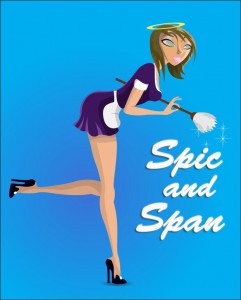 I don’t get it. I really don’t. How does anyone produce a spotless manuscript? I can’t tell you how many times my latest manuscript was proofread. By myself, at least a hundred times, but I understand why I can’t see the typos. I know what it’s supposed to say, so I am the worst one to proof it. Yet you take my semi-worthiness and multiply it times, let’s say, conservatively, ten full, slow, looking-for-errors reads—that’s still a pretty decent going-over.
I don’t get it. I really don’t. How does anyone produce a spotless manuscript? I can’t tell you how many times my latest manuscript was proofread. By myself, at least a hundred times, but I understand why I can’t see the typos. I know what it’s supposed to say, so I am the worst one to proof it. Yet you take my semi-worthiness and multiply it times, let’s say, conservatively, ten full, slow, looking-for-errors reads—that’s still a pretty decent going-over.
Then there’s my wife. Her nickname is “Hawkeye”. Ironically it has nothing to do with her proofing skills or her husband once living in Iowa; apparently she was in a M*A*S*H unit with a guy named “B.J.” and a really hairy dude who liked to dress in drag.
(Give me a break; it was more original than “Take my wife. Please.” Right?)
Anyway, she read the manuscript as many times as I did (at least).
My great friend Trish read bits and pieces and kibble and bits until it was fully finished and THEN read it at least a couple more times for good measure.
My editor has a keen eye, but admittedly he wasn’t looking for typos as much as content, story, plot, flow, etc. But another set of eyes it was.
Then I sent the manuscript off to my reliable proofreader, and as always she still found a few (by this time, it was about as clean as I would expect a manuscript to be). Now after I get the doc back from Becky, my proofreader, I consider it golden. Particularly taking into account all the proofing beforehand. It’s done.
But I read it again anyway. So did my wife.
And we still found one or two—nothing major, nothing glaring, but there they were, looking back sheepishly and shrugging as if to say “We tried to be found, we really did.”
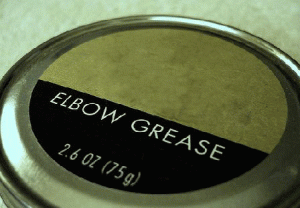 Finally, you accept that you’ve simply done all you can, and that it’s a LOT. Not as if you just wrote it, perused it, and threw it up there (as I am sure there are some chowderheads that do). So on the Kindle it was published. And it got some rave reviews (and, by God, a couple of emails to me stating “Hey, I found one typo…”). Son of a BISCUIT EATER. So, well, it’s Amazon digital, and I can upload a new copy (which I hate to do because it’s really not fair to the previous purchasers, but since I’m about a million sales or so shy of my first million, I figure, I’ll fix ’em).
Finally, you accept that you’ve simply done all you can, and that it’s a LOT. Not as if you just wrote it, perused it, and threw it up there (as I am sure there are some chowderheads that do). So on the Kindle it was published. And it got some rave reviews (and, by God, a couple of emails to me stating “Hey, I found one typo…”). Son of a BISCUIT EATER. So, well, it’s Amazon digital, and I can upload a new copy (which I hate to do because it’s really not fair to the previous purchasers, but since I’m about a million sales or so shy of my first million, I figure, I’ll fix ’em).
Then I get the paperback proof in the mail. And it looks good. Damn good. There are some font issues and some other crap (and I do end up finding some editorial fixes my editor missed—i.e. things he told me to fix in one spot but I found another place where the same thing needed to be changed). No biggie. I’m over it now. The paperback is about to be done, I put the two documents side by side (digital manuscript and the one formatted for the press), and I start making them identical. Like I said, no big changes (mostly fonts and such with the paperback version), until about three-quarters of the way through, I see it.
The exact sentence?
“You have proof off these allegations?”
It’s not like it’s buried in a hundred-word paragraph somewhere. There are only six words on the line!
I was dumbfounded. Aghast. Pale as Peter’s pecker after he picked a peck of pickled peppers.
Excuse my French but FUCK. My wife could not (and most likely did not want to) stop me from punching myself in the face repeatedly. (That actually took my mind off the typo, believe it or not, and got rid of that pesky tooth that was aching all this time.)
It was all I found, reading every word of the paperback proof, front to back, but for the record: Off didn’t look sorry at all. He looked downright proud of himself, no doubt having shouted “hey, over there, is that ELVIS?” as each of us got to that point in the novel.
Or perhaps he was peering from behind Peter’s peck of peppers.
Oh hell, I don’t know what that little bastard did to escape detection but he deserves the Medal of Honor for Typographical Mistakes for his efforts above and beyond the call of duty. And man did it ever feel good to delete that extra “f”.
Can a book—ANY book—be perfect? I started searching the Internet for proofreading software. There are a few products out there. Has anyone used a third-party software package before? Microshaft Word 2010 just plain pisses me off. I have grammar-checking turned off during the writing phase because it just doesn’t mesh well with my writing style. Fiction writers use everything from sentence fragments to speech colloquialisms to whatever else. HOWEVER, I always do one full grammar check on the manuscript before it’s done-done. I turn on everything. It’s painstaking, and I have to dismiss 99% of it, but here’s the real fly larvae in the pea soup:
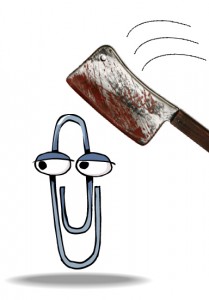 While I‘m typing, Word will make a (blue-underlined) suggestion to me if I write “Here’s the think, Dad…” It will underline “think” and ask me if I meant “thing”, even with “grammar-checking as I write” turned off. Sometimes. But it will not find that same mistake during the grammar check.
While I‘m typing, Word will make a (blue-underlined) suggestion to me if I write “Here’s the think, Dad…” It will underline “think” and ask me if I meant “thing”, even with “grammar-checking as I write” turned off. Sometimes. But it will not find that same mistake during the grammar check.
Nor, apparently, will it find: “You have proof off these allegations?”
You’ve seen “Death to Smoochy”? I’m currently writing the screenplay for “Death to Clippy”, and it’s going to make “Friday the 13th” look like “Saturday the 8th”, I kid you not.
Do me one last favor, however, before the end, and before you comment (if that’s your intent). Read this to yourself:
I cluod not blveiee taht I cluod aulaclty uesdnatnrd
waht I was rdanieg. The phaonmneal pweor of the hmuan
mnid. Aoccdrnig to a rscheearch sudty at Cmabrigde
Uinervtisy, it deosn’t mttaer in waht oredr the ltteers
in a wrod are, the olny iprmoatnt tihng is taht the frist
and lsat ltteer be in the rghit pclae. The rset can be a
taotl mses and you can sitll raed it wouthit a porbelm.
Tihs is bcuseae the huamn mnid deos not raed ervey lteter
by istlef, but the wrod as a wlohe.
Amzanig huh? Yaeh and I awlyas thgouht slpeling garmmar
wrer ipmorantt.
I realize it’s not exactly pickled peppers to pcilked ppepers, but still, it’s the best I can do, so I rest my case.
~~~~~~~~~~~~~~~~~~~~~~~~~~~~~~~~~~
The blank page is dead…long live the blank page.
~~~~~~~~~~~~~~~~~~~~~~~~~~~~~~~~~~
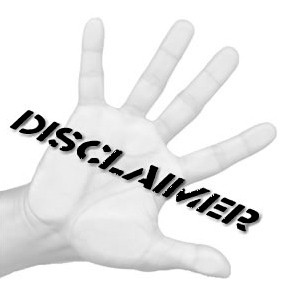 Author known to use spontaneous satire, sarcasm, and unannounced injections of pith or witticisms which may not be suitable for humorless or otherwise jest-challenged individuals. (Witticisms not guaranteed to be witty, funny, comical, hilarious, clever, scintillating, whimsical, wise, endearing, keen, savvy, sagacious, penetrating, fanciful, or otherwise enjoyable. The Surgeon General has determined through laboratory testing that sarcasm can be dangerous, even in small amounts, and should not be ingested by those who are serious, somber, pensive, weighty, funereal, unsmiling, poker-faced, sober, or pregnant.)
Author known to use spontaneous satire, sarcasm, and unannounced injections of pith or witticisms which may not be suitable for humorless or otherwise jest-challenged individuals. (Witticisms not guaranteed to be witty, funny, comical, hilarious, clever, scintillating, whimsical, wise, endearing, keen, savvy, sagacious, penetrating, fanciful, or otherwise enjoyable. The Surgeon General has determined through laboratory testing that sarcasm can be dangerous, even in small amounts, and should not be ingested by those who are serious, somber, pensive, weighty, funereal, unsmiling, poker-faced, sober, or pregnant.)



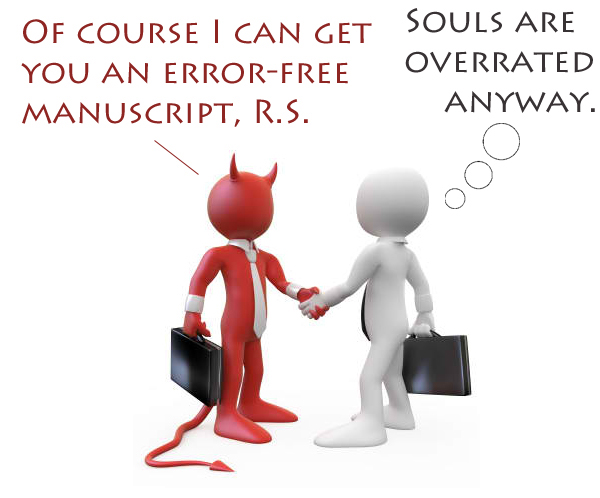

This is one of the best blogs I’ve read on typos, I wrote one myself. Great to know I’m no alone in this, and I did think souls were overrated at one point…
Thanks, Javier…and you’re right, you’re not alone. 😉
You’re right it’s tough. My publisher’s proof-reading my book at the moment – I’ve read it a million times but they’ll still find loads. Perhaps the piece of my writing I read and re-read most carefully was a short story a few thousands words long I was lucky enough to win a decent prize with a few years ago – I thought not a word was out of place in that. Then I read it at a lit fest and got a random laugh in the wrong place. When I got back home I read the passage again and found that yes – the guy in the crowd was right – there was a double entendre in there which I hadn’t intended.
It’s a challenge, that’s for sure. But I’ve yet to read a book without a typo in it somewhere, from the bestsellers all the way down. Great writing can withstand a few typos, and even an unintended double entendre. 😉 Thanks for the comment, Chris.
Rob, proofreading is a really tough project anyway you go at it. I seldom see a book without one or two typos at least. I find it gets harder to spot them the more times I read one of my own manuscripts because I get so tired of the book after a while. I agree that it is easier to spot them in other people’s work because I am not so close to the words, and I am not filling in the blanks in my mind. Without regard to the difficulty of it, I think independent writers have to strive for perfection on this front because our writing is always under a microscope. We probably are held to a higher standard than traditionally published writers on this issue because readers who think indies are suspect to begin with tend to focus on the least little misstep we make.
I feel your pain.
That’s what sticks on my craw: we’re actually held to a HIGHER standard because one error and it’s “oh, just a typical crap indie book”. Actually I think we’re also forgiven for one or two but that’s the limit. Thanks for the response, Stephen. 🙂
I always hate it when I write a post on grammar and then, two weeks later, find a grammatical error in the post. *headdesk*
Thanks for making me laugh.
Ha, yes—I am most nervous when writing or commenting on grammar, correctness, etc. A Twitter goofball yesterday responded in snark to one of my quotes from my new book where I had mixed metaphors. One of 40 quotes from the book and this joker (neither of us follows the other) decides to try out his newly found pith. He misspelled two out of ten words in his tweet. Kind of draws the air out of the hilarity I’m sure he intended at my expense. I resisted the urge to pounce, wildly tempting as such an opportunity seemed; he was, after all, foundering in that damn fish barrel and I with the loaded shotgun. 🙂
There is always something that will slip through – I think I’m a pretty good line-editor/proofreader, and I *still* miss things, I know that. I know stuff on which I’ve worked that has already have 5 editing passes and I still found a lot. *shrug* At the end of the day, you can only do the best you can and if there are only a few things left, you’ll just have to deal with the haters and say “hey, you’re so smart, YOU do the editing and see how well YOU do!” Heh. I never complain unless there are more than, say, 5 egregious word misuses or something like that. 🙂
You literally put the second “L” in LOL for me this morning when i read your “hey, you’re so smart” comment. Should use LLOL (Literally Laughed Out Loud). Priceless and true. I’m the same way—as long as it’s not egregious (still, I couldn’t forgive five egregious errors, I don’t think. Certainly 4-5 honest typos or common misuses, though). 🙂
I find this manuscript editing tool great for eliminating a lot of the quick wins from my work before I send it to a professional editor. I think it saves me a bunch of money because the editor can concentrate on more complex things rather than simple repeated phrases, etc..
Thanks, Chris! I’m going to check it out TO-DAY. 🙂
That is a rare form of anxiety, indeed. Typos are the source of a sinister, burning shame if they are missed. “How many pairs of eyes of eyes does it take to ensure a clean manuscript?”
This is what I would ask the oracle.
Sounds like a light bulb joke: How many authors does it take to produce a completely error-free book?
Answer: No one knows; they gave up a long time ago and are replacing all the light bulbs in the house. 🙂
Great post, kiddo! Only you can come up with a million words to say about a typo. I do have a limit to what I will tolerate, though. You may misspell pickled peppers, but never misspell pecker or penis. Ask Jack Durish. If a post has either of those two words, yours truly is THERE. And I like my peckers to be perfect.
Thanks for putting the “out loud” in LOL for me today! HA. And it’s not even a thousand words. Okay, maybe 1200. 😉
It is a frustration, actually more than that. I just don’t want to bring your blog under the pale of my Canadian lumberjack vernacular. I got one of my books back the other day from a new proofread and there on the first page-ONE THE FIRST PAGE- was a typo we’d all missed 18,139 times.
However, being an indie writer feels a great deal like being a woman. We have to strive to be ten times better than that other group as we somehow started off behind the line. So endure my friend, win through endurance.
I laughed out loud when I got to “Death to Clippy.” My god. I’d pay good money for that.
But I’d say if that was the only typo left, ya did good, kid.
As usual, a great post! You always make me smile, grin and frequently ‘laff me arse off’! I had a similar experience, in that the word ‘was’ was repeated in the second paragraph of page 1 of my book! The poor manuscript was frazzled from being dragged across two continents on both sides of the Atlantic and read to death by hungry eyes eager to find errors. But, just like your ‘off’, my ‘was’ stood proudly at attention, screaming “I’m invisible! I’m invisible!” and by God he was until publication when he started dancing about screaming “Look at me!”
Before sending my manuscripts to proofreaders, I do one last check by reading the book backwards. Somehow, this allows me to see more errors. Perhaps it’s because I’m not going with the flow of the tale. I’m not sure, but it works for me. Most of the time…